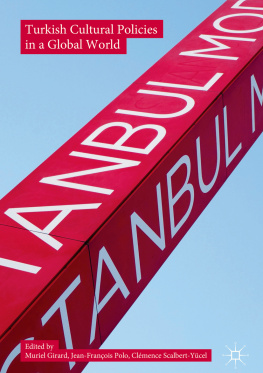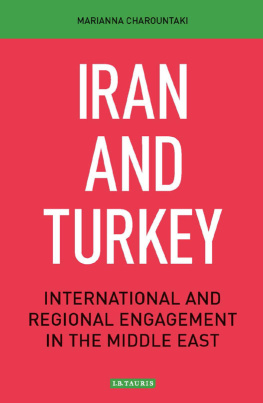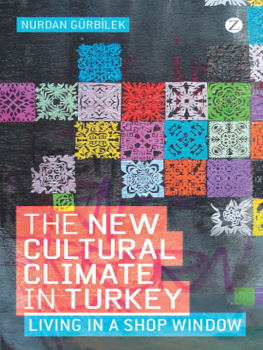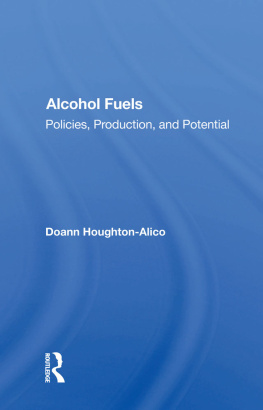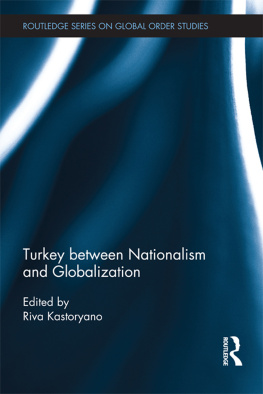Introduction: Turkish Cultural Policies in a Global WorldCirculations, Territories, and Actors
Muriel Girard
is Associate Professor of Social and Human Sciences at the cole Nationale Suprieure dArchitecture de Marseille (ENSA-M) and a member of INAMA research laboratory (INvestigations sur lhistoire et lActualit des Mutations Architecturales, ENSA-M). Her research focuses on heritage and memory processes, handicraft and urban dynamics in cities of the Maghreb and the Middle East. Recently she has edited a special double issue of European Journal of Turkish Studies , Heritage Production in Turkey. Actors, Issues, and Scales, Part I Producing an Official Heritage in a Time of Neo-Ottomanism: Critical Approaches, 19 (2014), http://ejts.revues.org/4930 ; Part II Alternative heritages, the tribulations of recognition, 20 (2015), http://ejts.revues.org/4933 .
Jean-Franois Polo
is Associate Professor of Political Science at Sciences Po Rennes, France, and member of ARENES (French National Research Centre-UMR 6051). From 2012 to 2016, he was seconded to Galatasaray University in Istanbul. His research focuses mainly on cultural policies in Turkey and France. His recent publications are, with F. stel, Les nouvelles orientations de la politique culturelle Turque: la recherche dun modle conservateur alternatif?, Ple Sud , 41, 2 (2014/2) 1732; The Istanbul Modern Art Museum: An Urban Regeneration Project?, European Planning Studies , 23: 8 (2015) 15111528; with Baudelle G. and Krauss G. (eds), Le rle des muses dans le dveloppement rgional , Rennes: Presses Universitaires de Rennes, 2015; with R. Lecler, Un transfert avort. Limpossible exportation du modle franais de financement du cinma en Turquie, in Marchetti D. (ed.), La circulation des productions culturelles. Cinmas, informations et sries tlvises dans les mondes arabes et musulmans , Rabat-Istanbul co-dition lectronique CJB-IFEA, 2017.
Clmence Scalbert-Ycel
is Senior Lecturer at the Institute of Arab and Islamic Studies at the University of Exeter where she teaches ethnopolitics and K urdish studies. She is the author of several works on language policies, Kurdi sh literature and heritage, including Langue, Littrature et engagement. Le champ littraire kurde en Turquie19802010 (2014). She is a member of the Editorial Board of the European Journal of Turkish Studies .
Past and Present Cultural Policies in Turkey: From Building the Nation State to Disputed Pluralism
Over the course of the 2000s the Turkish artistic scene flourished, with Istanbul emerging as one of the most dynamic cities in the world.).
However, over the course of the 2010s, this remarkable dynamic stalled and Turkey now stands at a crossroads. Signs that this dynamism was on the wane could already be seen in April 2015, when the Turkish cultural policy study days from which this volume stems took place.
Some chapters in this book mention these recent events in passing. It is still too early to assess their consequences, even though these may be readily imagined given earlier comments about the freedom of expression and action available to artists and cultural actors. However, this book does not set out to analyze how the drift towards authoritariani sm in Turkey has impacted on the artistic scene. Instead, it looks at transformations in cultural policies over the past 20 or so years, during which, as just pointed out, there have been phases of cultural thriving, along with a diversification of actors and the missions assigned to cultural policies. That is why cultural policies is referred to here in the plural, for it would be a mistake to examine only cultural actions carried out by the state or local authorities.
Indeed, Turkey has a highly diverse range of cultural actors who do not necessarily share the same value systems or ideological references, and whose presence across the country varies. Secularized cultural circles (Kemalists, Europeanists, and the far left) exist alongside more traditional and conservative circles, often with ties to the AKP . But there are also actors who voice their affiliation to minority identities (Kurds, Armenians, Romas, Alevi, Jews, etc.), migrant communities (Syrians, Africans, Central Asians, Uyghurs, etc.), and territories in present-day Turkey (the Bla ck Sea, the Aegean Sea, Thrace, Hatay, Anatolia, etc.) or the Ottoman realm (Caucasia, the Balkans , Aegean and Mediterranean islands, etc.). These circles sometimes act through associations and foundations. They can receive backing from the public authorities, draw on community support, and attract foreign funding (from the European Union [EU], diasporas, non-governmental international cooperation, etc.). In the early 2000s, cultural expression was supported by EU integration policies, particularly the EU Promotion of Cultural Rights in Turkey program. Cultu ral action by the K urdish movement also had undeniable knock-on effects, unshackling the cultural and artistic expression of other ethn ic groups in the country at a time when cultural diversity was generally being promoted (Scalbert-Ycel ).
Mention also needs to be made of the processes of popular creation and consumption. The media and cultural industr ies have been instrumental in the emergence of popular styles rooted to varying degrees in certain areas, communities, and local histories. Examples of this include the popular musical forms of arabesk (Stokes ).
Turkish state intervention in art and culture clearly stretches back a long way, to the beginning of the Republic (Ada and nce ).
It was only after the second half of the twentieth century that new cultural policies started to emerge in Turkey, based on those being set up in Europe. Vincent Dubois argues that it was only then, in liberal democracies, that cultural policy emerged as a category of public action, endowed with a specific budget and administration, a coherent doctrine, and the requisite administrative and political management (Dubois
National cultural policies have thus never been cut off from major debates about the changes affecting the cultural sector worldwide, such as how the state should intervene and finance culture. Other topics include the dynamics of cultural decentralization driven by local authorities, private initiatives by associations and activist networks, and major economic groups in the form of cultural patronage ; new ways in which cultural goods are consumed and distributed (particularly over the Internet); and the increasingly diverse missions assigned to cultural policies. Each state implements its cultural policy in the light of choices, debates, and actions by previous governments, even though these may be contested or viewed as an imposition. Cultural policy in Turkey thus needs to be seen within the context of a long history, an aspect explored by several chapters in this work. Categories, ways of doing, and actors circulate. Cultural policy also results from the dissemination of models , especially within the context of globalization. That is why this book focuses on analyzing cultural policies in the light of these circulations, as discussed later.
Over the past 30 years, Turkish cultural policy has undergone changes comparable to those affecting cultural policies in Europe as analyzed by Jean-Pierre and Guy Saez, who highlight the processes of metropolitanization, Europeanization , and regional dynamics, and those arising from economic (liberalization, creative and cultural industries ) and technological (digital indust ry) change (Saez and Saez ).

